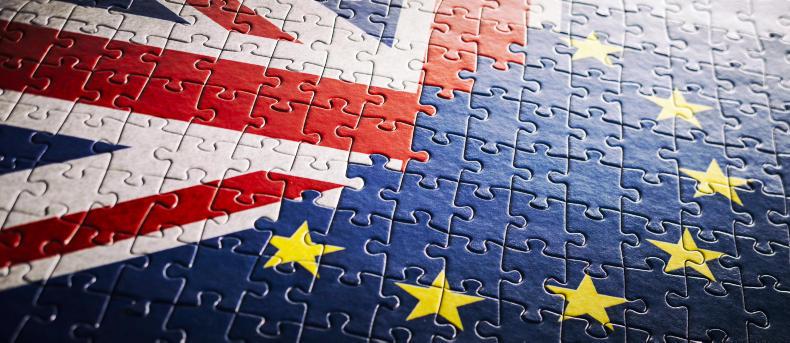With EU foreign ministers due to meet this week to sign off the EU position for phase two of the Brexit negotiations, differences in the UK Conservative party in recent days have created more uncertainty.
On 8 December, agreement was heralded over the 'croissant conference' in Brussels between UK Prime Minister and EU Commission President, Jean Claude Junker.
This agreement had an element of ambiguity and carefully chosen words to allow everyone sign up believing their core negotiation positions to be intact.
It was interpreted by Ireland and the EU 27 that the default position was that the UK would align with EU rules, enabling something close to the status quo continue.
That was shattered over the last week when UK Chancellor, Philip Hammond caused outrage among many in the party by saying that the UK would remain close to the EU after Brexit.
Conservative party problems now have the potential to derail the concensus that was put in place in December
At the weekend the UK Brexit Minister David Davis and Business Secretary Greg Clark issued an open letter designed to reassure business that there would be a two-year period with no change and there are rumblings about extending the transition to three years.
This has caused consternation among the believers of a full Brexit, with Jacob Rees Mogg, an aristocratic-styled back bencher emerging as the main spokesman for the hard Brexit view.
Conservative party problems now have the potential to derail the concensus that was put in place in December that enabled the real talking about Brexit to begin.
Real talking
The real talking that is beginning now will bring conflicting positions to a head, but only when the UK arrives at a defined position, which still seems some way off.
Basically the choice remains; the EU will grant the UK as close an arrangement as it wants after Brexit but only if it sticks to EU rules.
This is what the Taoiseach referred to as the 'Canada-plus' model. However that equally presents big problem for those in the UK who want maximum freedom to negotiate deals as they like after Brexit.
This is the problem that will develop in negotiations over the coming months.
Dark cloud
The uncertainty caused hangs over the Irish agricultural sector like a dark cloud.
This is exacerbated by the prospect of a bad Mercosur deal that seems to be getting closer as well.
Irish farmers will be hoping that, at the very least, the Mercosur deal makes provision for adjustment to reflect any negative impact that arises from the UK leaving the EU.
Read more
Time for Taoiseach to 'have farmers' backs'
Time for 'heavy lifting' on Mercosur deal
With EU foreign ministers due to meet this week to sign off the EU position for phase two of the Brexit negotiations, differences in the UK Conservative party in recent days have created more uncertainty.
On 8 December, agreement was heralded over the 'croissant conference' in Brussels between UK Prime Minister and EU Commission President, Jean Claude Junker.
This agreement had an element of ambiguity and carefully chosen words to allow everyone sign up believing their core negotiation positions to be intact.
It was interpreted by Ireland and the EU 27 that the default position was that the UK would align with EU rules, enabling something close to the status quo continue.
That was shattered over the last week when UK Chancellor, Philip Hammond caused outrage among many in the party by saying that the UK would remain close to the EU after Brexit.
Conservative party problems now have the potential to derail the concensus that was put in place in December
At the weekend the UK Brexit Minister David Davis and Business Secretary Greg Clark issued an open letter designed to reassure business that there would be a two-year period with no change and there are rumblings about extending the transition to three years.
This has caused consternation among the believers of a full Brexit, with Jacob Rees Mogg, an aristocratic-styled back bencher emerging as the main spokesman for the hard Brexit view.
Conservative party problems now have the potential to derail the concensus that was put in place in December that enabled the real talking about Brexit to begin.
Real talking
The real talking that is beginning now will bring conflicting positions to a head, but only when the UK arrives at a defined position, which still seems some way off.
Basically the choice remains; the EU will grant the UK as close an arrangement as it wants after Brexit but only if it sticks to EU rules.
This is what the Taoiseach referred to as the 'Canada-plus' model. However that equally presents big problem for those in the UK who want maximum freedom to negotiate deals as they like after Brexit.
This is the problem that will develop in negotiations over the coming months.
Dark cloud
The uncertainty caused hangs over the Irish agricultural sector like a dark cloud.
This is exacerbated by the prospect of a bad Mercosur deal that seems to be getting closer as well.
Irish farmers will be hoping that, at the very least, the Mercosur deal makes provision for adjustment to reflect any negative impact that arises from the UK leaving the EU.
Read more
Time for Taoiseach to 'have farmers' backs'
Time for 'heavy lifting' on Mercosur deal






 This is a subscriber-only article
This is a subscriber-only article










SHARING OPTIONS: